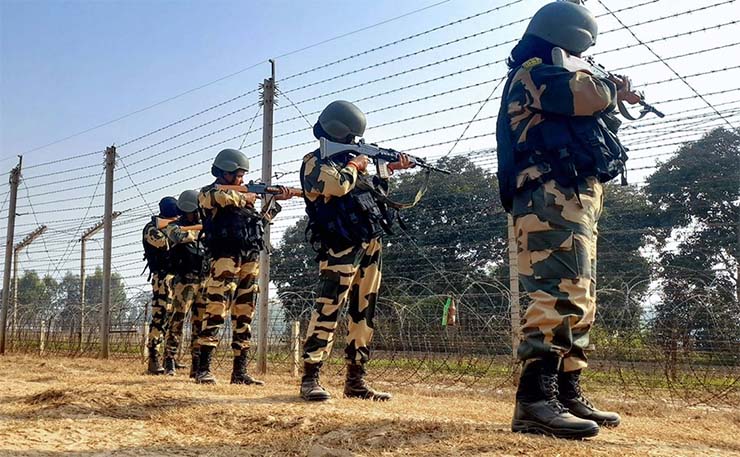
If there is anything constant about the global politics, it is change. The everchanging geo-strategic situations in the world keep posing challenges as well as opening new windows of opportunities for the nations to make or break their relations. This week, Indian government took the historic decision to abolish Free Movement Regime (FMR) along the Myanmar border in order to safeguard the internal security of India. On the other hand, Pakistan is looking forward to a new government as its people participated in the national election held this week to choose their new government.
Indian Minister of Home Affairs, Amit Shah, announced this week that the Indian government has taken the decision to abolish the Free Movement Regime (FMR) along the Myanmar border in order to safeguard India’s internal security and preserve the demographic composition of its Northeastern states. The Ministry of Home Affairs has proposed an immediate suspension of FMR this week. Under FMR, any member of a hill tribe who is a citizen of either India or Myanmar and resides within 16 km on each side of the border could cross with a valid border pass for up to two weeks per visit. The unfenced 1,600+ km-long border between India and Myanmar fosters familial and ethnic connections among people from both sides, which led to this arrangement initially. In 1968, government notification limited free movement up to 40 km on each side before it was reduced further to 16 km in 2004. The provisions under FMR were last amended in 2016. “It is Prime Minister Shri Narendra Modi Ji’s resolve to secure our borders. MHA has decided that the FMR between India and Myanmar be scrapped to ensure the internal security of the country and to maintain the demographic structure of India’s North Eastern States bordering Myanmar. Since the Ministry of External Affairs is currently in the process of scrapping it, MHA has recommended the immediate suspension of the FMR,” Amit Shah posted on X, this week. The announcement by Ministry of home Affairs regarding the FMR follows his meeting with Manipur Chief Minister N. Biren Singh in Delhi recently. The Chief Minister frequently attributed ongoing ethnic violence between the tribal Kuki-Zo and Meitei communities in Manipur to the FMR, which is a serious matter of concern for the whole nation. Although the arrangement was actually suspended in 2020 due to the COVID-19 pandemic, the Ministry has taken the official decision to abolish FMR. The Indian government had raised security concerns regarding FMR with Myanmar on multiple occasions, but Myanmar did not show any sense of urgency in addressing the issue. The officials claim that Myanmar perceives its western border with India as relatively peaceful compared to its eastern or northern borders and hence remained indecisive on this matter. Indian government has taken this decision to secure this porous border with Myanmar. This decision would also help in containing the separatist forces based in the forest areas near this border responsible for the bloody clashes with Indian security forces and the native tribals of Northeast. This decision would also prove beneficial in containing illegal movements of arms, goods and narcotics. Indeed, this would help in stabilizing the present affairs of state in Northeast. Well done Mr. Shah!
This week, Pakistan’s citizens participated in the national election to choose their new government. A public holiday was announced on Thursday to allow over 120 million voters to exercise their right to vote. The tallying of votes commenced after polling ended and reports from individual polling stations began arriving once the obligatory one-hour restriction concluded. Candidates supported by Imran Khan’s political party PTI have asserted success after the voting trends became apparent. They have also accused unfair practices at polling sites and intentional delays in announcing results. Hours after the violent polling day, Pakistan’s Election Commission began releasing results. PTI-backed independent candidates are leading in five National Assembly seats, while PML-N and PPP are each leading in four seats. The nation’s political history is marked by three constitutions, three military coups, and none of its 30 prime ministers completing a full term. Unlike India, Pakistan experienced delays in constitution-making and holding general elections after becoming an independent nation. Later the world witnessed how military took over the control of its political regime. Presently, Pakistan is facing many economic and political challenges; and the troubles double as it has also lost its reputation in the international domain. Its close ally of the past, the US has stopped supporting it, and its new ally, China is known for its debt diplomacy. Restoration of democratic values and stability in Pakistan is not only essential for its own existence as a sovereign state, it is also vital for peace and security of the Asian region. So far, we can only hope for it!
Though we know that the realist connotation of power and self-interests cannot be demolished totally, but still, we can at least contribute from our sides by choosing the side of cooperation, non-violence and development. Hope the world picks the message from India, “Sarve Bhavantu Sukhinah!”
The author is Professor, School of International Studies, JNU